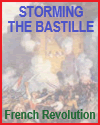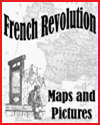Learning about Bastille Day offers your K-12 students valuable insights into history, culture, and civic ideals. As France's national holiday commemorating the storming of the notorious Bastille prison on July 14, 1789, the event marks a pivotal moment in the French Revolution and the fight for liberty, equality, and fraternity. Studying Bastille Day helps your students draw connections to broader themes of democracy, revolution, and human rights, complementing lessons on the American Revolution and other global independence movements.
For your younger students, Bastille Day introduces basic concepts of fairness and freedom through age-appropriate stories and activities like crafting French flags or reenacting key events. Your older students can analyze primary sources, compare revolutions, or debate the lasting impact of Enlightenment ideals.
This holiday also provides a gateway to exploring the beautiful French language, art, and traditions, fostering cultural appreciation in an increasingly interconnected world.
Discussing Bastille Day encourages critical thinking about how nations remember their histories and celebrate national identity. By examining its parades, symbols, and controversies, students gain perspective on how public celebrations shape collective memory—an essential skill for engaged citizenship.
Ultimately, our free Bastille Day lessons make history vibrant, relevant, and cross-disciplinary.
|

















































